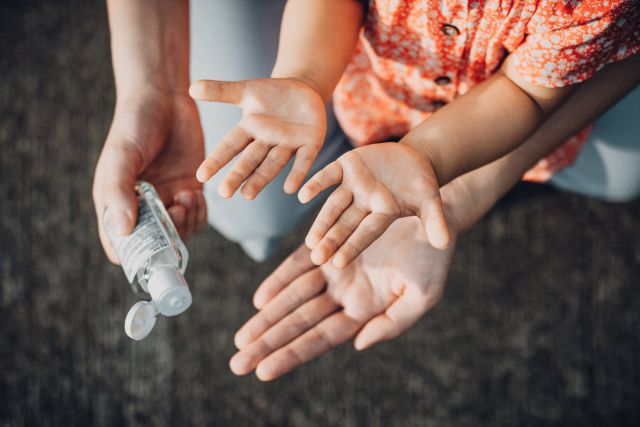Updated on March 8, 2024.
You may not see them, but germs are everywhere. They’re on your skin, inside your body, and all around you. From the minute you wake up in the morning until you fall back into bed at night, you’ll likely encounter billions of microorganisms throughout your day.
Before you break out the hazmat suit, it’s important to understand that not all of the germs you’re exposed to on a daily basis are harmful. In fact, some microscopic bugs are actually helpful, explains Burt Banks, MD, a family medicine physician affiliated with Grand Strand Medical Center in Myrtle Beach, South Carolina.
“I think it would be completely impossible to avoid germs entirely, and I don't think that we would really want to, because there are some beneficial bacteria and organisms that actually help us function better as humans,” Dr. Banks explains. “Our bodies do a pretty good job of fighting off the bad germs and we sometimes use the beneficial bacteria to help fight off those infections as well.”
While exposure to germs throughout your day is inevitable, there are certain common pathogens that could make you sick. It’s a good idea to be mindful about these germs and try to avoid them as best you can. Some common culprits include cold and flu viruses, norovirus (the germ that causes “stomach flu”), as well as staph, E. coli, and other types of bacteria, Banks points out.
Once your day begins, there are many ways you can be proactive and help reduce your risk of infection, including:
Keep your hands clean
Some germs can survive on surfaces for hours. Respiratory viruses contained in droplets from coughs or sneezes can land on commonly used objects, desks, and countertops. Touching contaminated surfaces—like doorknobs, light switches, ATM machines, elevator buttons, and other everyday items—then rubbing your eyes or touching your nose or mouth can lead to infection.
Viruses and bacteria can also spread through direct contact, including shaking hands, hugging, or kissing.
Washing your hands thoroughly and often with soap and water is one of the most effective ways to protect yourself against respiratory and foodborne illnesses as well as infections that cause vomiting and diarrhea.
“Washing your hands for 20 seconds or long enough to sing the ABCs is typically adequate,” Banks says.
If you don’t have access to soap and water, using an alcohol-based hand sanitizer is a good alternative—if you choose the right one and use it frequently and properly, Banks points out.
“Many germs including certain types of bacteria, such as strep, staph, E. coli, and MRSA as well as the flu, RSV, and some hepatitis viruses, are very susceptible to hand sanitizers,” he says. Keep in mind, however, these products are not effective against all germs, including norovirus, and they aren’t a substitute for hand washing. Some are also more effective than others, Banks adds.
“The problem with hand sanitizers is that their effectiveness is short-lived and depends on the concentration of alcohol. The greater the concentration, the better the hand sanitizer works.”
Choose a hand sanitizer than contains at least 60 percent alcohol, the Centers for Disease Control and Prevention recommends. Before applying the liquid or gel, remove as much dirt or debris from your hands as possible. Read the product label for instructions and apply as much as directed to ensure its effectiveness. Then, rub the sanitizer over all surfaces of your hands until they are dry.
Be sure that your hands are clean before eating or touching your eyes, mouth, or nose, after using the bathroom and while working in the kitchen. “I cringe when I see people blowing their noses and then cooking,” Banks says. “Proper hand hygiene really is critical when you're preparing foods.”
Don’t assume that just because you’re at home you can let your guard down. “We tend to get a little bit more relaxed around family members and not think about it as much because we're always together,” Banks adds. “But the best way we can protect our families is to really be aware of trying to avoid spreading our bad germs to them.”
Keep your distance
Someone with the flu can spread the virus to others who are standing up to six feet away. Other viruses that cause the common cold, measles and pertussis (whooping cough) can also spread through the air via droplets from the coughs and sneezes of infected people. If you inhale these contaminated droplets, you could also become infected. Play it safe and keep some distance between you and anyone who is or appears to be sick.
Don’t share your stuff (or borrow from others)
You may be more mindful about germs in restrooms and public places but become relatively lax when you’re around friends and coworkers. Sharing or exchanging personal items, such as towels, razors, lipstick, and water bottles, can spread infection. Don’t use someone else’s utensils or drink from another person’s glass.
Disinfect common surfaces routinely
Similarly, it’s important to be vigilant about germs at home, routinely cleaning your bathroom and kitchen countertops. But you could also protect yourself from infection by disinfecting other objects and surfaces you come into contact with throughout your day, advises Banks.
“Anything you touch is a mechanism for transmitting infections—even cell phones,” he says. “We should use antiseptic wipes to clean those fairly frequently, as well as doorknobs and faucet handles.”
When you’re at the grocery store, give the shopping cart handle a rub with a disinfecting wipe to reduce your exposure to harmful bacteria. The same goes for workout areas, according to Banks. “Clean the equipment and mats with antiseptic wipes because a lot of skin infections can be transmitted on those surfaces,” he advises.
If you work in an office, it’s a good idea to clean your keyboard, desktop, and other surfaces you touch on a regular basis. Keep your work area stocked with tissues, soap, alcohol-based hand sanitizer, and antiseptic wipes.
Keep cuts and scrapes clean
If you have an open wound, such as a cut, scrape, or burn, it’s important to keep it clean and covered, particularly when you’re in a crowded or communal setting, such as a gym or pool. You may be exposed to bacteria, like staph or MRSA, by touching contaminated surfaces or through skin-to-skin contact with an infected person.
“You can get a pretty significant infection if even just a small crack, cut or an abrasion on the skin becomes contaminated,” Banks cautions.
Don’t go barefoot
If you plan to use a public or semi-public shower, like at school or at work, don’t forget to bring flip-flops or water shoes.
“If you have bare feet in public areas, you have to worry about athlete's foot—a fungus that can affect the feet, particularly between the toes,” Banks advises. “Those are definitely areas where you should try to avoid any exposure. If you’re in a public shower, using flip-flops rather than standing barefoot on the shower floor would be a smart thing to do.”
Going barefoot could also increase your risk for plantar warts, which are caused by human papillomavirus, or HPV. The virus can enter your body through tiny cuts, scrapes, or other wounds on the bottom of your feet.
Be cautious about buffets and communal food trays
Despite calls for people to wash their hands often, some may simply forget. So, you may be rolling the dice if you dive into a communal candy dish or cookie platter that lacks a clean serving utensil, according to Banks.
“That's definitely a possible setting for a GI disaster, although it's very tempting,” he notes. It’s also a good idea to avoid eating uncooked foods that can't be washed, Banks adds.
If you’re eating out at a buffet or salad bar, make sure the foods that should be cold are chilled and the hot foods are steaming, which could help you avoid food-borne illnesses. It’s also wise to avoid eating perishable foods that have been sitting out at work or a party for more than two hours without refrigeration.
Clean or replace your toothbrush
Toothbrushes can harbor bacteria and other germs, particularly if they are stored in a container. Toothbrushes that are leaning against others can also become contaminated.
After brushing, allow your toothbrush to air dry in an upright position—preferably several feet away from the toilet and sink. These personal items should normally be replaced every three to four months, but if you or other members of your household are sick, replace them sooner or make sure that they are thoroughly cleaned, according to Banks.
“You can actually clean them fairly frequently with a vinegar solution,” he says. “There are also disinfectant tablets and light sanitizers for toothbrushes that help eliminate some bacteria.”
Boost your immune system and vaccinate
Aside from doing what you can to stay healthy and keep your immune system strong, such as getting quality sleep, following a healthy diet, and exercising regularly, the most important way to avoid many risky infections, including measles, flu, pertussis, hepatitis, and varicella (chicken pox), is to be fully vaccinated against them.
“I really can't stress enough the importance of vaccinations in helping to reduce airborne infections,” Banks says.






